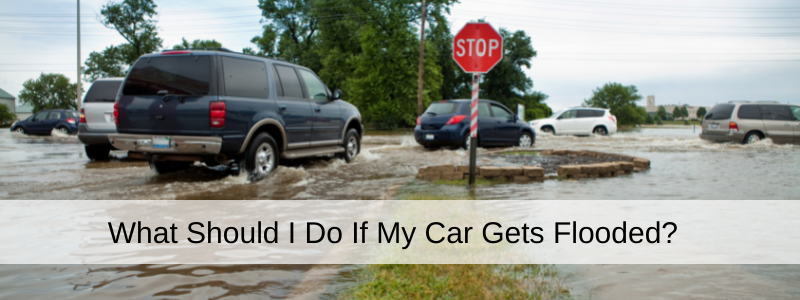
When Hurricane Ida pounded New Jersey last week, thousands of vehicles were impacted. Flooding, whether caused by hurricanes or severe storms, is the most common natural disaster in America, according to Census.gov. And while you may have successfully forged rising flood waters, it doesn’t mean that your vehicle is out of the woods. If floodwaters partially or fully submerge your car, it can mean extensive damage and costly repairs. Here's what to do after the waters recede.
Can a Car be Fixed after Being Flooded?
While in many cases you CAN get your vehicle fixed after flooding, it is a matter of how much it costs to fix a flood-damaged car compared to its insurance value. So before you start guessing if it's worth fixing a flooded car, assess the extent of the damage to your car.
- Check out the Damage - Survey the car's potential damage and note how high the water rose in your car. This will vary vehicle to vehicle. How high water has to be to flood a car, truck, or SUV depends on your vehicle's ground clearance. Trucks and SUVs generally have higher ground clearance (the measured height from the ground to the bottom edge of the vehicle's undercarriage) and can forge water a sedan traditionally can't.
- Document & Photograph - Take plenty of pictures and/or videos of the inside and outside of the vehicle. Cover every angle of the flooded car. If you are planning on requesting a water damage car insurance claim, you should document the evidence as soon as possible.
- Open an Insurance Claim - Contact your insurance agent as soon as possible. Since you can claim water damage on car insurance if you have comprehensive coverage, an adjuster would need to inspect the vehicle before approving flooded car repair costs. If you aren't sure if your vehicle is covered or not, you should still open a claim with your insurance company. And submit early! In the event of a large natural disaster, it is likely many others will be submitting their claims as well, so get in before the rest.
- Dry Out Your Car - If you drove through high waters and your vehicle is still running, allow it to dry out. It is hard to tell if you got water in your engine or if you have water damage to the car's electrical system. Driving with residual water in the engine or a faulty electrical system can cause even more damage. Then, bring your car to a Flemington Car & Truck Country authorized service center for a full evaluation of potential damage.
- Call a Professional - If your vehicle became submerged and the engine stopped, DO NOT try to restart your car. Excess water can cause a variety of issues to different aspects of your vehicle, including the engine, electrical systems, fuel line, and filters. Instead, contact a towing service to get your vehicle towed to one of our Flemington Car & Truck Country dealership service centers for evaluation.
- Schedule an Appointment - Contact one of our Flemington Car & Truck Country service centers so a certified technician can assess the damage to all the mechanical components, including the engine, transmission, axles, brakes, and fuel system for water contamination. And in some instances, water exposure will not surface earlier than 90 days, when computer and other electrical components begin to corrode.
How Hard Is It to Fix a Flood-Damaged Car?
Because water damage is not always visible to the untrained eye, it is important for a factory-trained mechanic to inspect the vehicle as soon as possible. The technician will most likely begin by looking for the most immediate signs of engine damage. This will likely be found in the engine oil and transmission fluid. By just checking the fluids with a dipstick you can see if there has been exposure. Water will make the transmission fluid look milky in consistency. Water in the oil pan will dilute the engine oil as well.
If the vehicle was exposed to salt or muddy water, the corrosion from either can cause rust inside components that will lead to further repair issues. Engines and electronics are not designed to handle these conditions, and the car will corrode and fail. That's an expensive proposition to remedy, and thus, the insurance company will often total a flood-damaged car. That's why it is best to take the vehicle to an authorized dealership for evaluation.
Once the extent of your vehicle's flood damage is determined, your insurance company will weigh the costs to repair the vehicle against the cost of replacing it. If your car is totaled (considered a total loss) by the insurance company, be sure to review what that means with your insurance agent.
Whether your vehicle can be repaired after experiencing a flooding event, or deemed a loss by your insurance company, our team is here to help. Contact any of our Flemington Car & Truck Country family of brands serving NJ, PA, and NY to repair your vehicle or find a replacement.

